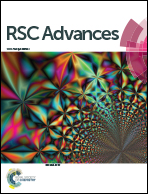Numerical study of the effect of wall temperature profiles on the premixed methane–air flame dynamics in a narrow channel
Abstract
Time-accurate simulations of premixed CH4/air flame in a narrow, heated channel are performed using the DRM-19 reaction mechanism. The effect of different wall temperature profiles on the flame dynamics is investigated for three different inflow velocity conditions. At a low inflow velocity of 0.2 m s−1, the flame shows instabilities in the form of spatial oscillations and even flame extinction. With the increase of the inflow velocity, flames are prone to showing more stability at a medium inflow velocity of 0.4 m s−1, and eventually show flame stabilisation at a high inflow velocity condition of 0.8 m s−1 for all the wall temperature profiles examined. The total chemical heat release rate and total gas–solid heat exchange rate are found to have a combined effect on the flame propagation speed that determines flame behaviours. Since the flame behaviours in terms of the oscillation frequency and amplitude for spatially oscillating flames, or the stream-wise stabilisation location for steady-state flames, are very sensitive to the chosen wall temperature profile, a “real” conjugate heat transfer model is recommended in order to capture all of the relevant combustion physics accurately.



 Please wait while we load your content...
Please wait while we load your content...